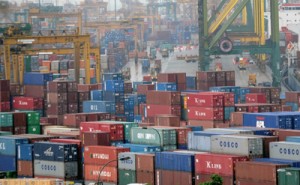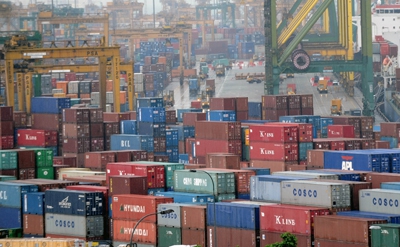
ISLAMABAD: Pakistan has accused Iran of slapping high import tariffs on items from Pakistani origin and frequent changes in import regime, well informed sources told Business Recorder.
The sources said Iranian authorities had imposed a ban on issuance of permit to kinnow importers which had adversely affected export of kinnow to Iran from Pakistan, �which is violation of Pak-Iran PTA.� The issue of ban on import of fruits from Pakistan may be taken up with Iranian side.
Pakistan�s major items of export to Iran include rice ($ 75.11 million), meat and meat preparations ($ 23.42 million), fruits & preparations ($ 11.80 million), agricultural products($ 6.96 million excluding rice and fruits, mostly live animals e.g, cows), non-value-added textiles ($ 10.80 million).
Major items of import include petroleum and petroleum products. However, Pakistan�s imports from Iran have decreased form $ 653.06 million in 2009 to $ 36.61 million in 2011. Others products include organic chemicals ($ 75.60 million), plastics ($ 65.37 million), iron ore and concentrates ($ 38.17 million), articles of iron and steel ($ 32.29 million).
Major bottlenecks in expansion of Pak-Iran trade include; (i) high import tariffs applied by Iran on items of export interest to Pakistan ;( ii) frequent changes in import regime of Iran; (iii) import authorization system and ;(iv) indirect trade via Dubai;�The sources were of the view that �Iran is still not a member of WTO and therefore follows a system of high import duties ranging up to 150% advalorem.� PTA signed in 2004, and implemented in 2006, has not contributed to increasing Pakistan�s exports due to high statutory import duties. According to sources, the Iranian economy is still closely regulated by the government.
The high import tariffs hinder enhancement of Pakistan�s exports to Iran. The import duties on items of our interest are as follows: (i) textile and garments; 70-100% advalorem and; (ii) surgical goods; 40-60% advalorem.
Non tariff barriers: The following are some of the non-tariff barriers which hinder enhancement of Pakistan�s exports:
Import Authorization System: According to Iranian system, all the importers are required to first register their requests for imports with Ministry of Commerce through a system called sabt-e-safaresh. After processing of the case, the Ministry of Commence issues an import permit which is valid for 6 months. In some cases, the issuance of import permit also requires NOCs from other ministries/ departments. When the Iranian government wants to restrict/ ban import of some items, it simply stops processing of import permits.
Frequent Changes in Import Regime: The Iranian rules and regulations change quite frequently and there is no official mechanism to notify such changes promptly. The aura of uncertainty in the local market deters business activity.
Late Publication of Annual Tariff Book: Every year, after commencement of the new Iranian year on 20/21 March, the Ministry of Commerce I.R. of Iran, publishes a book containing new import/ export regulations and customs tariffs as per harmonized commodity descriptions and coding system. This book is usually printed (in Persian language) always with delay. For example, the book Import & Export Regulation Act of Iranian year (21 March 2009 to 20 March 2010) was published in October 2009 with a delay of six months.
Problems in issuance of Visa for businessmen: The procedure makes it mandatory for all applicants of business visas to get certain medical test reports from specific laboratories. It also necessitates repeated personal presence of the applicant. This constitutes a classic example of a non-tariff barrier.
Banking problems: Banking restrictions imposed by the UN & the US on Iranian Banks have adversely affected Pakistani exports as major Pakistani banks no more accept LCs opened by these banks. So this factor has also discouraged our genuine exporters due to high risk involved in cash/ credit transactions. For example, in FY 2008-09, out of Pakistan�s total exports of US$ 399.4 million only US$ 12.5 million were transacted through banks via Asian Clearing Union (ACU) system. Presently, almost 97% of export proceeds from Iran are received via Hawala & Cash system. This system exposes Pakistani exporters to great risks of non-payment.
Indirect Trade via Dubai: Due to high tariff import regime imposed by the Iranian government, a large number of Iranian importers are forced to receive their imports from Pakistan and India through Dubai. Reportedly, the Iranian companies get the Pakistani merchandise at Dubai and from there they re-export it to their sister firms in Iran, suitably under-invoiced. Furthermore, owing to delays/ problems in opening Letters of Credit (LCs) from Iran, in a large number of cases the Iranian companies prefer to open LCs from Dubai through their sister companies for Pakistani merchandise which is directly shipped to Iran. However, in trade figures this is reflected as trade between the UAE and Pakistan.
Smuggling is probably the biggest hurdle in expansion of regular trade between Pakistan and Iran. In 2009-10 the total volume of formal annual bilateral trade was about US$ 1191.63 million, however, according to unofficial sources the annual informal bilateral trade is estimated to be approximately worth US$ 500 million. The best way to control smuggling could be through elimination/ reduction of tariff and non-tariff barriers, according to the sources.
Stringent quarantine requirements- These also pose a big impediment towards export of Pakistani fruits such as kinnows & mangoes to Iran. These harsh quarantine conditions imposed by the plant protection department of Iran are even stricter than those of the European Union, which hinder smooth supply of fruits through formal channels and encourage traders on both sides to employ informal ways of trade.
The Iran Project is not responsible for the content of quoted articles.











